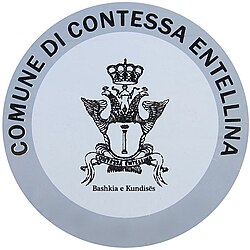Contessa Entellina
| Contessa Entellina | |
|---|---|
| Comune | |
| Comune di Contessa Entellina Bashkia e Kundisës |
|

Landscape of Contessa Entellina
|
|
 |
|
| Location of Contessa Entellina in Italy | |
| Coordinates: 37°44′N 13°11′E / 37.733°N 13.183°ECoordinates: 37°44′N 13°11′E / 37.733°N 13.183°E | |
| Country | Italy |
| Region | Sicily |
| Province / Metropolitan city | Palermo (PA) |
| Government | |
| • Mayor | Sergio Gioachino Parrino (since June 16, 2008) |
| Area | |
| • Total | 136 km2 (53 sq mi) |
| Elevation | 571 m (1,873 ft) |
| Population (2013) | |
| • Total | 2,184 |
| • Density | 16/km2 (42/sq mi) |
| Demonym(s) | Contessioti |
| Time zone | CET (UTC+1) |
| • Summer (DST) | CEST (UTC+2) |
| Postal code | 90030 |
| Dialing code | 091 |
| Patron saint | Saint Nicholas of Myra |
| Saint day | December 6 |
Contessa Entellina (Albanian: Kundisa; Sicilian: Cuntissa) is a small comune of 2,184 inhabitants in the province of Palermo, in Sicily, southern Italy.
Is located in the "Valle del Belìce" to 571 metres (1,873 ft) above sea level in the mountains called Brinjat, is situated 80 km from Palermo. The country, along with Piana degli Albanesi and Santa Cristina Gela, is among the three ethnic communities of Arbëreshë of Sicily, who still speak Albanian, carefully preserve the Orthodox rite, the Albanian costumes, musical and gastronomic traditions of the ancient Albania.
The foundation is attributed to about 1450 on the ruins of a remote farmhouse seniority, the "Comitissa", but the chapter officers, the granting of fiefs, were built in 1520, when he start the rebuilding, upgrading and restocking of Albanians from Albania and subsequently also by the southern Morea, from Albanian communities where they lived from 1300.
In ancient times it was near them the ancient Elymian city of Entella, in fact, with the discovery of archaeological ancient site, to give relief to the old site, you would add the name of the country, even the term Entella.
Today Contessa Entellina keeps the Albanian language, the culture of their ancestors, and holds the Byzantine-Greek rite; but lives a very difficult period. From earthquake of Belice to date have followed many migrations, halving the population and depopulating the city center, the Albanian language is also taught to fewer and fewer young people, so the community is constantly lost and stolen the identities.
...
Wikipedia

